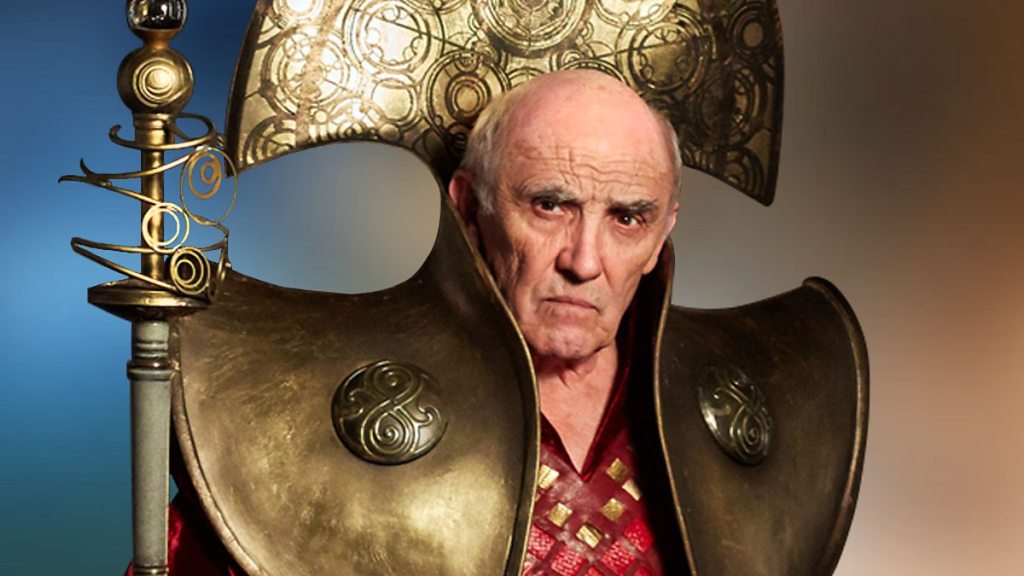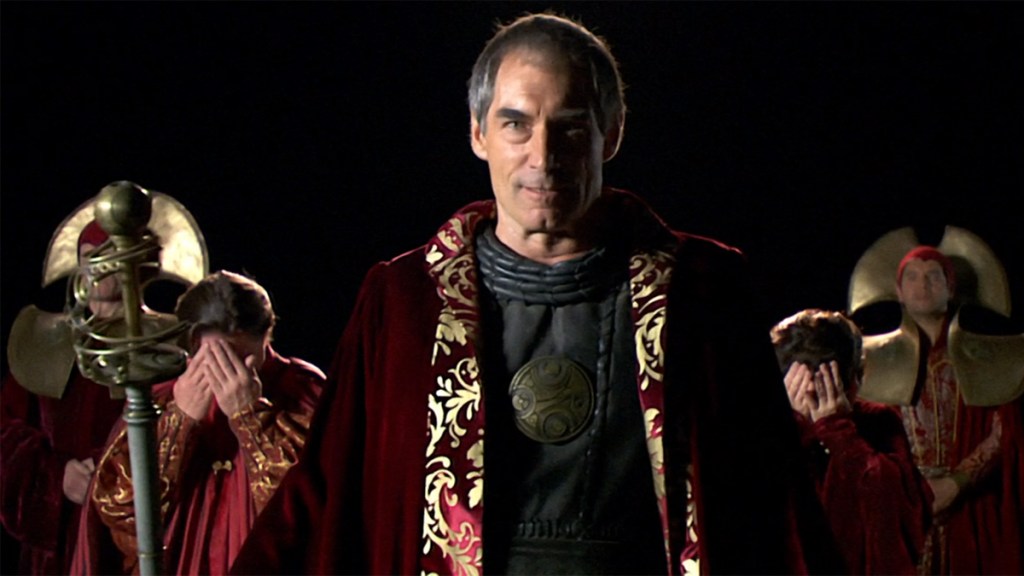The Time Lords were named and introduced in 1969’s ‘The War Games’, Patrick Troughton’s final story. The Doctor, who had previously stated he couldn’t return to his home planet, chooses to contact the Time Lords to solve a massive problem: a group of aliens, with a rogue Time Lord’s help, have kidnapped humans from different time periods to produce the ultimate army. The Time Lords are summoned to restore the many combatants to their correct locations in space/time, but they also trap the aggressors’ planet in a force-field and erase the surviving masterminds from existence. The Doctor is put on trial for interfering in other planets in conflict with the Time Lords’ non-interventionist laws and sentenced to exile on Earth and a forced regeneration.
All of which gives the Time Lords a sense of colossal power and calm, godlike detachment (“Do not make us force you to speak”), but also confirms they’re massive hypocrites; whom among us would not describe putting a planet inside a freaking force field as ‘interference’? After the Doctor defends his actions, the Time Lords agree, saying “We have accepted your plea that there is evil in the universe that must be fought, and that you still have a part to play in that battle.”
Aloof, Archaic Observers
The Time Lords are content “simply to observe and to gather knowledge”, according to the Doctor, who also states that while they don’t interfere usually “they had to when I called them for help”. Later we hear tales of Time Lord interference gone wrong (in ‘Underworld’, for example) and – get this – a massive war against Vampires in their early history. These led to the Time Lords rejecting violence and interference in other planets as a matter of policy, even if they were still completely capable of both.
Brutal pragmatists, then? Certainly when we see them after this, they maintain this sense of power and detachment. In ‘Terror of the Autons’ a Time Lord in a bowler hat and suit appears in mid-air to warn the Doctor that the Master is on Earth. In ‘The Three Doctors’ they attempt to overcome Omega’s power by sending multiple incarnations of the Doctor into action.
Though their depiction in 1976’s ‘The Deadly Assassin’ was controversial at the time, it isn’t such a massive departure from their previous stories. We’d previously seen a group of powerful, aloof aliens who were aware of their reputation; they could act, they could not be seen to act. In ‘The Deadly Assassin’ the Time Lords’ planet of Gallifrey was more explicitly made into Space Oxbridge: a place of vast power, yes, but also archaic and bewildering in its rituals, full of pettiness and snobbery. The history of the Time Lords has passed into myth, few understand the meaning of these rituals and symbolism. It’s staid, complacent, but also could remove your planet from existence if it wanted.

This fits, frankly, with the version of the Time Lords we had seen already: that was the public-facing version, this the private sphere.
Which is all well and good, but it only tells us what the Time Lords are, not what they actually do. On television, we don’t ever get a concise answer as to what they do, but you can piece something together.
Monitoring Fixed Points in Time
We know Time Lords perceive time differently to humans. We know they created time machines and the Tenth Doctor suggested they did a lot of watching (“When the Time Lords kept their eye on everything, you could pop between realities, home in time for tea. Then they died, and took it all with them. Walls of reality closed, the worlds were sealed.”). They would repair paradoxes (as described in ‘Father’s Day’) and can manipulate time to some extent (while they can remove seven people from existing in ‘The War Games’ they cannot – one assumes – simply do something similar with the key players in the creation of the Daleks).
From historical stories, and the Doctor’s assertion that you can’t change history leading to the concept of “Fixed points in time”, the Time Lords monitored history/time with these immutable moments presumably integral to the overall structure. Time can be rewritten (perhaps even at a fixed point) but not without danger (which presumably increases the more fixed said point is). The Time Lords then took it upon themselves to watch and maintain Time in order to prevent significant damage that could affect the spatial universe.
(Also, Time is a planet and a person, according to ‘Flux’, but honestly I’m not sure that impacts things that much or will ever be mentioned again.)
What About the Day-to-Day?
All of this sounds very lofty and impressive, but consider why the Doctor left: what does the day-to-day existence of a Time Lord look like? Once you’ve gazed into the Untempered Schism, passed through the Academy, been given a regeneration cycle and all the biological additions that seem to be required for being able to activate a TARDIS… after all that, what then?
‘Why did you run away from them in the first place?’
‘What? Well, I was bored.’
The War Games, Episode 10.
It’s the Gallifrey stories after ‘The Deadly Assassin’ where things start to get really mundane. If anything, these stories undermine any sense of power and awe, while ‘The Deadly Assassin’ merely shows Time Lords as staid and archaic and unaware of their colossal power. After that, the depiction of Gallifrey really heightens the tedium.
In ‘The Invasion of Time’ we get to see, among other things, a Time Lady’s day-job. Rodan maintains the protective transduction barriers around the planet, monitoring threats and reporting them to her superiors (“Do you know, I’ve passed the Seventh Grade and I’m nothing more than a glorified traffic guard?”) – she doesn’t get to actually raise the transduction barrier herself, just tell someone else when it’s time to do so. Her job is to watch and, presumably, maintain excellent bladder control.
Romana, the Doctor’s companion from Seasons 16 – 18, worked in the bureau of ancient records for a time. What this means, essentially, is database maintenance. The next story set on Gallifrey, ‘Arc of Infinity’, shows us two technicians in the records section, Damon and Talor. Talor is killed early on, his last words unfortunately being “Impulse laser?” – something akin to Ned Stark’s last words being ‘Big axe?’ – and Damon is given a variety of technical jobs to do but his actual role seems to consist of monitoring and reporting. As with Rodan, despite his obvious talent, there isn’t a lot for him to do unless the planet is being threatened. This is presumably so they didn’t have to cast another actor in ‘Arc of Infinity’, but it gives the impression that there is only one technician on Gallifrey and he has to do everything, up to and including sharpening pencils because the Castellan doesn’t like the noise.

In what is possibly an ‘Arc of Infinity’ reference, ‘The Name of the Doctor’ starts with two technicians working on equipment in the bowels of Gallifrey, but who are also monitoring the security cameras in the TARDIS workshops. Presumably they report it to someone, but maybe not; the hierarchical system also indicates a sense of powerlessness: you have to report things rather than actually sort them out yourself. In ‘Arc of Infinity’ the entire story wouldn’t happen if the Castellan – the Head of Security in the Time Lord Capitol – actually did his job properly when Talor reported the data theft to him. Actually being a Time Lord or Lady sounds like – for the most part – administrative tedium with unreliable bosses.
In ‘Genesis of the Daleks’ the Time Lord messenger says “we foresee a time when they have destroyed all other life in the universe” and ‘The End of Time’ has The Visionary, who appears to have some prophesying abilities, but we’re not 100% clear on how well and how far into the future Time Lords can see. The implication of the ending of ‘Kill the Moon’ is that the Doctor can sense future timelines. However, this does not mean that you can simply do all the work in advance, because once you’d done all the work in advance, the results of that work would cause ripples in the fabric of space/time and necessitate further work somewhere else and that work would create more ripples and so on and so forth. This means that any sense of having power over Time – which you’d think would help in their work – actually makes it more frustrating.
You can see why the show has moved away from stories set on Gallifrey. The whole reason the show is fun is because the main character specifically chose not to stay on Gallifrey. This is because – despite the big collars and the portentous titles and the epic legends of harnessing the powers of black holes – being a Time Lord is essentially just admin.
Doctor Who returns to BBC One, BBC iPlayer and Disney+ in November for three 60th anniversary specials.
